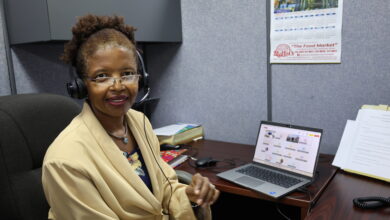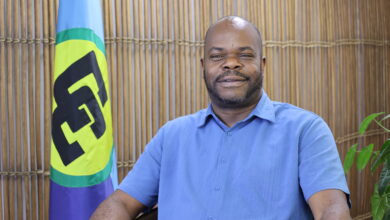Caribbean Community (CARICOM) Ministers of Agriculture and Trade participated in the Seventeenth Meeting of the Council For Trade and Economic Development (COTED), at the Crowne Plaza Hotel in Port-of-Spain, Trinidad and Tobago on 16-17 June 2004, under the chairmanship of Hon. Montgomery Daniel, Minister of State in the Ministry of Agriculture of St. Vincent and the Grenadines. The main focus of the Meeting was on issues relating to the agriculture sector. The Ministers took a number of decisions aimed at promoting the competitiveness and positioning of Agriculture in the Region towards ensuring a better life for the people of the Caribbean and for an effective interface within the hemispheric and global economy. This was being done, the Ministers agreed, recognising the critical linkages between agriculture and other sectors and particularly in the context of the CARICOM Single Market and Economy (CSME) and the international trade agenda.
At the opening of the meeting, statements were presented by His Excellency Mr. Edwin W. Carrington, Secretary-General of CARICOM; the Hon. Jarrette Narine, Minister of Agriculture of Trinidad and Tobago; the Hon. Ignatius Jean, Minister of Agriculture, Forestry and Fisheries of Saint Lucia; and the Hon. Montgomery Daniel of St. Vincent and the Grenadines.
In setting the framework for the Meeting, the CARICOM Secretary-General noted that at the global level, no issue has been more central and more difficult in the negotiations for a World Trade Organization (WTO) trading regime emerging from the Doha development agenda than agriculture; and indeed none will be more decisive in the process of rekindling those negotiations.
The Secretary-General pointed out that the task of developing the agriculture sector was not one for Governments alone. All stakeholders including the CARICOM private sector, specialised agricultural bodies, development banks and other financial institutions, farming associations and tourism organizations, he said, have a critical contribution to make to the process of developing the multifaceted sector.
Chairman of COTED, Hon. Montgomery Daniel expressed the view that agriculture stands out as one of the most, if not the most, significant sector to the economy of the Region and in particular, the Windward Islands in terms of its multiplier effect and as a vehicle for employment. Describing agriculture as the “Queen” in the chess game that is played out in the Free Trade Area of the Americas (FTAA), the WTO and the African Caribbean and the Pacific/European Union (ACP/EU) Partnership Arrangements, he noted that the COTED was key to the whole negotiating process.
The COTED reviewed critical aspects of the elements for the transformation of agriculture into a competitive sector focusing on agribusiness development. Recognising the value of research and development to the forward movement of agriculture in the Caribbean, the COTED took note of the work of the Caribbean Agriculture Research and Development Institute (CARDI) and its mandate for Technology Generation, Validation and Transfer in the Region. Particular note was taken of the efforts of CARDI to meet its commitment under the Regional Transformation Programme for Agriculture (RTP) as the lead agency in these matters and in the Region's technical cooperation programmes with various agencies such as the Food and Agriculture Organisation (FAO) and Inter American Institute for Cooperation on Agriculture (IICA) as well as the assistance programmes with a number of countries including Spain and Italy.
Ministers of Agriculture and Trade reviewed the developments and challenges for the key commodities of bananas, rice, sugar, citrus, poultry and the newer areas of focus such as the Brewery industry, dairy products, pork and red kidney beans. The meeting considered the fundamental importance of the banana industry to the economies of CARICOM Member States and the critical need for the Region's industry to continue accessing its traditional export market on no less favourable conditions than currently exist. In this regard, the recommendations from the International Conference on Bananas held in the St. Vincent and the Grenadines on 8-10 June 2004 were endorsed and the positions taken there are to be transmitted to the Meeting of Heads of State and Government of the ACP Group, to be held soon in Mozambique.
The COTED Ministers commended the initiatives taken by the Lead Head of Government with responsibility for Bananas, Dr. the Hon. Ralph Gonzalves, Prime Minister of St. Vincent and the Grenadines, and supported the proposal for a technical task force to develop and implement a Plan of Action (POA) and to establish an advisory team to support the Lead Head of Government with responsibility for Bananas. The COTED also commended the efforts to restructure the industry in the Region with the assistance of the European Union and other groups, institutions and organizations; and expressed appreciation to these bodies for their assistance, while committing to continuing research and development towards competitiveness and diversification as an integral part of the strategy for Caribbean bananas.
The COTED noted the significance of rice internationally as a staple and noted that the industry had the potential to satisfy the Region's domestic requirements. The meeting noted the strategies put forward by the industry towards ensuring its international competitiveness through consolidation, improved management, growth, expansion and integration of the industry, and reviewed the Regional Rice Monitoring Mechanism.
Deliberations on sugar formed an important part of the meeting of COTED, and Ministers noted the need for a Regional regime in the context of increased sugar refining capacity in the Caribbean. The need for continuous lobbying at all levels, including Ministerial and Private Sector, was highlighted at the same time that attention was drawn to the impending review by the EU of the sugar regime. In reviewing the industry, COTED Ministers commended the Sugar Association of the Caribbean (SAC) for its relentless and concentrated efforts in promoting the industry while safeguarding its gains and noted the recommendations emerging from their analysis of the industry and the international implications.
Developments in the international trade negotiations as they relate to agriculture were also considered by the COTED, which noted that agriculture – primarily the treatment of subsidies – remains at the centre of the difficulties confronting the FTAA process, and that CARICOM, in an effort to move the FTAA negotiations forward, has made its own proposals on agriculture at the level of the Trade Negotiations Committee (TNC). The meeting observed that the ACP/EU Economic Partnership Agreement for the Caribbean (CARIFORUM) region has now entered the second (regional) phase; and that the Region's draft negotiating guidelines, which contain a significant section on agriculture (including specific products and fisheries) is in the process of being finalized in time for the next meeting of the COTED.
Developments and initiatives in all Member States were reviewed with a view to facilitating exchanges in areas of common interest and identifying areas of best practice for implementation in other Member States.
The COTED advanced the process for the establishment of the Caribbean Agricultural Health and Food Safety Agency (CAHFSA) and agreed that the organization should be hosted by CARDI while pointing to the institutional relationships with organisations such as the Caribbean Environmental Health (CEHI) and the CARICOM Regional Organisation for Standards and Quality (CROSQ).
Other issues considered by the Seventeenth Meeting of the COTED included intra-regional trade in goods, standards development and CROSQ, and transportation; particularly, the new International Ship and Port (ISP) Code with its July 1, 2004 deadline and the Maritime Transport Security ACT (MTSA). The CARICOM Ministers also discussed a number of critical items relating to the sustainable development of the Region, especially in the context of the ongoing international negotiations for the ten-year Review of the Barbados Programme of Action for Small Island Developing States (SIDS).





